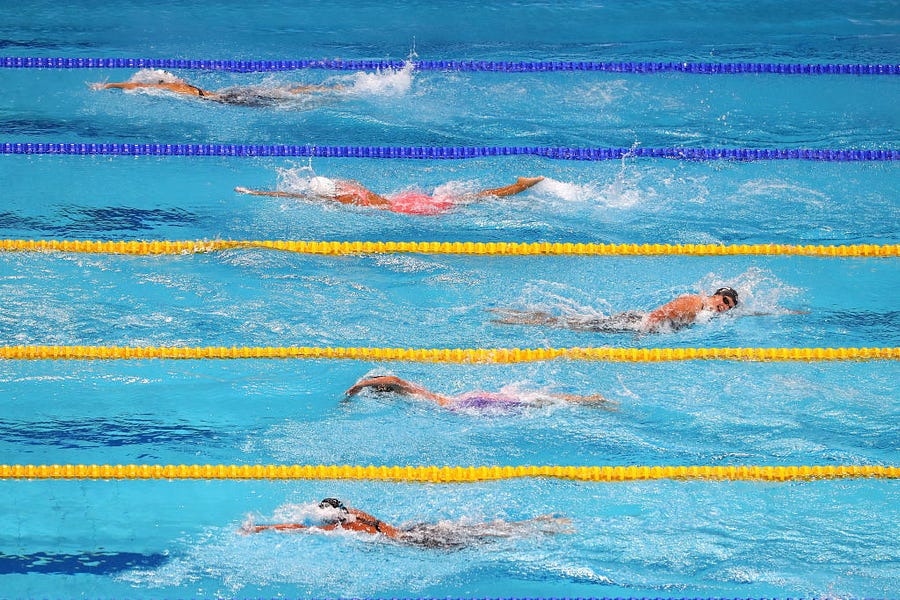With her trademark supremacy in the pool, Katie Ledecky won the 1500 meter freestyle at the US Olympic Trials by a full 10 seconds, swimming a 15:40.50 in June. That was 20 seconds from her 2018 world record of 15:20.48—but was easily the fastest time in the world this year. This is the first time the 1500 meters will be part of the Olympic swimming program for women.
The men have had the race as an Olympic event since 1908, but it took a competitor of Ledecky’s caliber to persuade the IOC to add it to the calendar. Finally, women may compete in the longest, toughest, most mentally and physically challenging race the pool has to offer.
Ledecky was a virtually unknown 15-year-old at the 2012 London Olympics when she won the gold medal in the 800 freestyle by more than 4 seconds. In a sport often measured in milliseconds, such a significant margin of victory—and from someone so young—was remarkable.
Ledecky has been called the most dominant swimmer in the world—male or female—but she’s never been able to compete in her most dominant event on the Olympic stage. The 1500 meters has been relegated to the World Championships and occasional Pro Series meets. She owns the top times in history for the event, and her world record (15:20.48) is a full 18 seconds quicker than the best time of the next fastest swimmer, Lotte Friis of Denmark. Her record time would rank 62nd among the top 100 men’s times in U.S. history. It would have qualified her for the 2020 Olympic Trials meet in the men’s category.
So why did it take so long for the International Olympic Committee (IOC) to allow the 1500 meters race on the women’s side? The answer is rather unsatisfying. A preference for short sprints and exciting relay races tends to dominate the IOC, who for years saw the 1500 meters as a boring race that simply took too much time to cover, and likely wouldn’t have enough international interest to have a range of countries compete. This argument is fundamentally flawed, though, and leaves more questions than answers.
If the mile is so boring, why even bother allowing the men to race it? When asked about this discrepancy former Olympic team coach Bob Bowman said, “I actually think women are better suited, physiologically, for 1,500 meters than they are for the 800 because they’re more endurance-oriented.” Yet up to this point, the longest race that women could swim in the pool was the 800m freestyle. (The IOC also added the 10k open-water swim for both men and women in 2008. The open-water swim takes an average of two hours.)
The Fédération Internationale de Natation, the international administrator for water sports, introduced the women’s 1500 to its biennial world championship meet in 2001. Since then, many different countries have medaled in the event and it is reasonable to expect more women to train for the 1500 now that is an option at the Olympic level.
The middle 500 meters of the race may not make for the most exciting television, but to suggest 1500 is boring is a gross misstatement. It takes far more strategy than an all out sprint, and the beginning is not necessarily indicative of the final results.
There was concern that if the IOC added the 1500, it would cut the 800. Instead, the IOC added the 800 to the men’s side, and the 1500 meter to the women’s, creating equal event lists for both groups.
With the top 10 times in history for the event, Ledecky is widely expected to be the inaugural gold medalist. She will also swim the 200 meter, the 400 meter, and the 800 meter freestyle.
This is a huge step in the larger story of women’s swimming. Women were first allowed to compete in Olympic swimming in 1912, but American women did not join the ranks until 1920 due to a rule requiring women to wear full length skirts, showing no leg. The first two women’s swimming groups in the United States, the National Women’s Life-Saving League and the Women’s Swimming Association were required to wear stockings, a skirt, and shoes while swimming.
Ledecky is the latest in a long line of American distance swimmers who have dominated on the world stage. Debbie Meyer was the first women’s gold medalist in the 800, Kim Linehan held the 1,500-meter freestyle world record for nearly a decade, and Kate Ziegler focused on long-distance swimming, setting several records during her career. But Ledecky is most similar to Janet Evans, who held the world records in the 400, 800, and 1500 for 15 years—until Ledecky came along. As to what to expect from Ledecky in this first Olympic 1500 meter race, take it from Evans: “No one can touch her.”






Please note that we at The Dispatch hold ourselves, our work, and our commenters to a higher standard than other places on the internet. We welcome comments that foster genuine debate or discussion—including comments critical of us or our work—but responses that include ad hominem attacks on fellow Dispatch members or are intended to stoke fear and anger may be moderated.
With your membership, you only have the ability to comment on The Morning Dispatch articles. Consider upgrading to join the conversation everywhere.